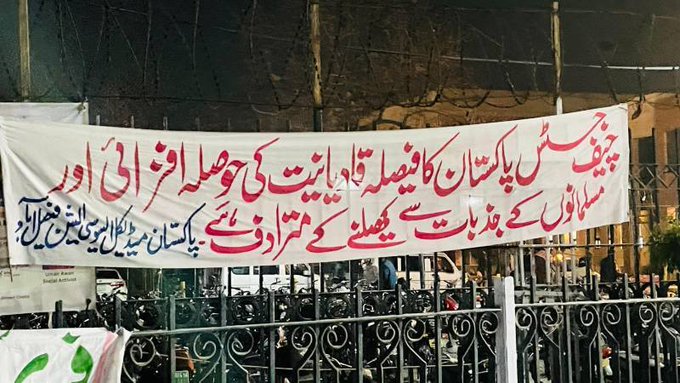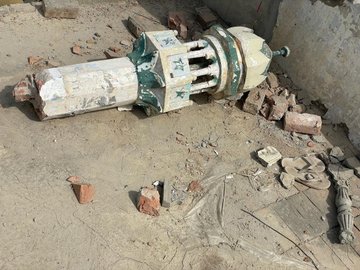It was a dark day in history—September 7, 1974. The day when a community that had lived in Pakistan for generations, contributing to its growth, was cast out by their own country. The Parliament of Pakistan, through a constitutional amendment, declared Ahmadis as non-Muslims. This decision, which should have been a matter of faith left to individuals, became a heavy chain that would bind the Ahmadi community in years of suffering, fear, and isolation.
After this amendment, Prime Minister Zulfiqar Ali Bhutto stood before a crowd and delivered an emotional speech. “Look!” he exclaimed. “Our achievements are before you, our efforts in solving the ‘problem’ of the Ahmadis after 90 years are in front of you.” Little did many know that what Bhutto hailed as an achievement would go on to erase the safety and dignity of an entire community.
Observers said that this moment marked the beginning of an unforgiving journey for Pakistan’s Ahmadis, one that would shrink their space in society, erode their rights, and turn their homeland into a place of persecution.
Fast forward ten years to the reign of Pakistan’s military dictator General Zia-ul-Haq. The persecution only worsened. In 1984, an ordinance was passed that criminalized basic expressions of the Ahmadi faith. Ahmadis were now forbidden by law to refer to themselves as Muslims, to call their places of worship mosques, to say “Assalam Alaikum” or even utter “Bismillah.” For these basic acts of faith, they could be imprisoned for up to three years.
The very act of practicing their beliefs had been turned into a crime. Yet, in a tragic contradiction, Pakistan’s laws also claim that it is a crime to discriminate against anyone based on their religion. How could this be reconciled? It couldn’t. And it didn’t.
Now, fifty years after that fateful constitutional amendment, the Ahmadi community continues to suffer in silence. Every day, new videos flood social media with inflammatory statements, declaring Ahmadis as ‘obligatory’ targets of hate and violence. Their lives have been filled with fear, their faith turned into a reason for their suffering. What was once a proud community has been relentlessly silenced, their existence marred by prejudice and injustice for half a century.
Religious hate speech against Ahmadis has reached beyond political rallies and religious processions, seeping into television screens and flooding social media platforms. Every hateful word, every dangerous statement, puts the lives of this vulnerable community at risk. It’s not just rhetoric anymore; it’s a call to violence, a message that echoes across the country with devastating consequences.
The BBC Urdu team collected a grim series of videos that are being shared widely across social media and WhatsApp, spreading like wildfire in a land already consumed by intolerance. These videos, dripping with venomous hate, were shown to Yasir Latif Hamdani, a human rights lawyer. His reaction was outrage: “These are clear violations of the law,” he said. “These are in direct conflict with the PICA Act, meant to prevent electronic crimes.”
But the violations don’t stop there. These statements, calling for harm against Ahmadis simply for their beliefs, also break Sections 153A and 295A of the Pakistan Penal Code. It’s not just a moral crime—it’s a legal one. Hamdani reminded us that targeting a minority for their faith is not only an incitement to violence but a crime punishable by arrest.

Yet, the silence is deafening. No action is taken against those spewing this venom. The personalities making these inflammatory statements continue their hate campaigns, and social media is left unchecked, a breeding ground for intolerance. No arrests, no consequences, as the Ahmadis are left to navigate a world where every day, their very existence is at risk.
The recently published report by Pakistan’s National Commission on Human Rights (NCHR) is a chilling testament to the ongoing persecution of the Ahmadi community. Titled ‘Monitoring the Plight of the Ahmadiyya Community,’ the report doesn’t just acknowledge the longstanding cries of human rights organizations—it marks the first time an official body has openly recognized the prejudice, violence, and hatred faced by this marginalized group. It’s a call to action, urging the government to confront the hate speech that endangers the lives of Ahmadis every day.
One such tragedy unfolded in early 2024 when Burhan Ahmad (name changed) was brutally attacked in the Hasilpur area of Punjab. Two unknown assailants shot him dead—a direct result of the hatred stoked by inflammatory sermons in a local mosque. According to the Human Rights Commission of Pakistan (HRCP), the attackers confessed to carrying out the murder after a fatwa from a religious figure, believing it would grant them a place in heaven. A life lost, another family shattered, all in the name of blind hate.
The Ahmadi community had reported the rising threats to local police before the attack, but their cries for help went unheard. When the murder finally took place, it wasn’t just the shock of loss that engulfed Burhan’s family, but the unbearable aftermath. His wife, Umta Al-Bari (pseudonym), still can’t forget that day. With trembling hands and tear-filled eyes, she recounted, “When I went and saw, my husband was lying dead… surrounded by people. I couldn’t bear it. Think of the feeling when a child sees their father’s lifeless body on the ground for hours.” Her voice broke under the weight of grief as she relived that moment, a moment no one should ever have to endure.
The report paints a bleak picture, revealing that the police allegedly advised the family not to label Burhan’s murder as an act of religious violence. Instead of seeking justice, the family was forced to flee their land, their lives uprooted once again in search of safety. The agony of this story is one among countless others—a cruel reminder that prejudice against Ahmadis in Pakistan is not just systemic, but deadly.
The data from the National Commission for Human Rights (NCHR) paints a heartbreaking picture of the relentless persecution faced by the Ahmadi community in Pakistan. The report is not just a collection of numbers—it’s a chilling testament to the lives shattered by hatred, the families torn apart by violence, and the constant fear that grips an entire community. The report calls for urgent action, a cry for justice that has been ignored for far too long.
Since 1984, 280 innocent Ahmadis have been killed—simply for their faith. Another 415 have been attacked, wounded, and traumatized. These aren’t just statistics; they are lives cut short, families who have lost fathers, mothers, sons, and daughters, all for believing in something different.
Even in death, Ahmadis are not granted peace. From January to September 2023 alone, the NCHR reports 39 cases where the bodies of Ahmadi community members were exhumed from their graves, an act of desecration so cruel it defies belief. In 99 cases, graves were vandalized, and in 96 cases, Ahmadis were denied the dignity of being buried in common cemeteries. They are not just persecuted in life but haunted even after death.

The attacks extend to their places of worship, sacred spaces meant to offer solace but instead become targets for mobs filled with hate. Recently, in Pakistan-administered Kashmir, a mob attacked an Ahmadi place of worship, beating men and women alike in a frenzy of violence. Ahmadis in the area had lived under the shadow of rising tensions, constantly threatened and intimidated. Despite raising alarms with the police, their pleas were met with silence. No action was taken.
The report makes it clear: the Ahmadi community is not safe in their own homeland. Their lives, their graves, their places of worship—nothing is spared from the fury of religious bigotry. This is not just a failure of the state; it is a moral failure of the highest order. The world cannot continue to look away as an entire community is pushed to the brink, living each day in fear, their very existence hanging by a thread.
The vandalism of Ahmadi places of worship in Pakistan paints a picture of deep-seated intolerance, fueled not only by extremist groups but also, shockingly, by those meant to uphold the law. The government’s National Commission for Human Rights (NCHR) report, covering just the first nine months of 2023, reveals a disturbing truth—police were present or involved in several incidents where Ahmadi places of worship were damaged.
Religious groups claim that under Pakistan’s laws, Ahmadis are forbidden from constructing places of worship that resemble Muslim mosques. This argument has been used to justify the demolition of parts of several Ahmadi worship sites in recent years. But there’s a legal precedent that’s being ignored—a decision by the Lahore High Court clearly states that this law does not apply to Ahmadi places of worship built before 1984. Yet, time and again, this decision is cast aside.
One such place of worship in Sheikhupura, built-in 1962-63, should have been protected by this very ruling. A local Ahmadi from the area said that the community had even informed the police of the High Court’s decision, hoping it would prevent the destruction. But hope was met with silence. The police took no action to stop the damage and, in some cases, seemed to be complicit in the acts of vandalism.
These attacks are not just on buildings; they are attacks on a community’s right to exist, to worship, and to live without fear. Each act of vandalism is a reminder of the relentless persecution the Ahmadi community faces—a persecution that is reinforced not just by extremists but by those entrusted with the law.
The National Human Rights Commission report has laid it bare: the lives, the property, the places of worship, and even the graves of Ahmadis are not safe in Pakistan. Entire communities are being targeted—not just individuals. This is not an isolated issue; it is a deep-rooted bias entrenched in the very fabric of the legal system.
